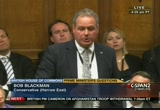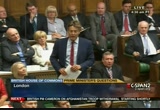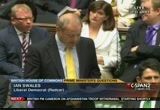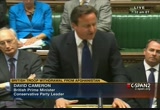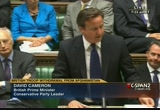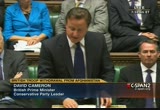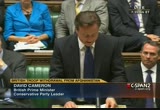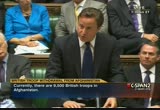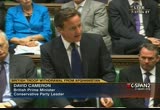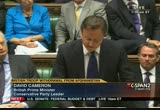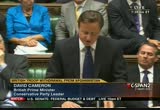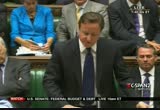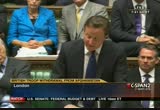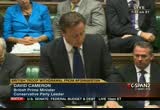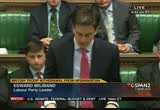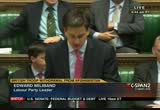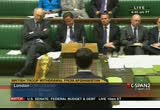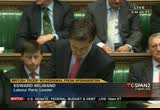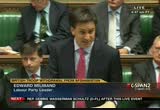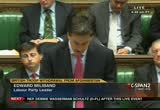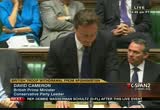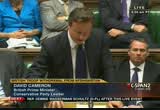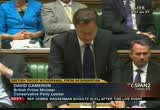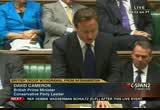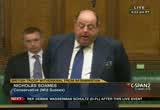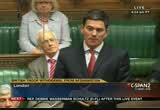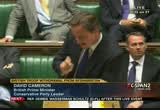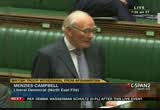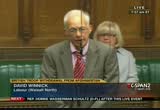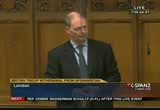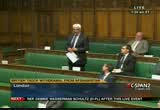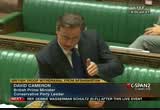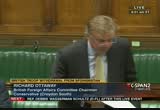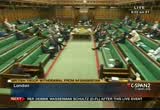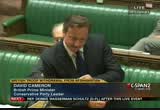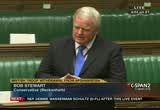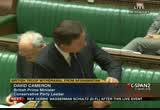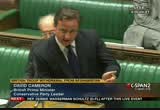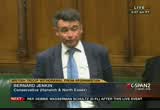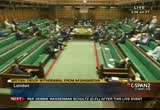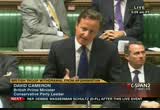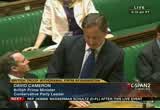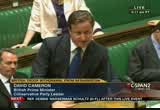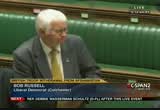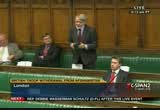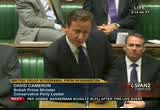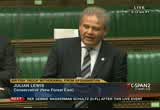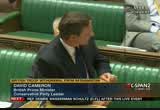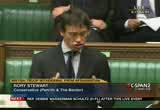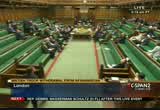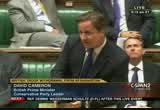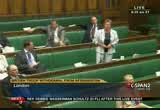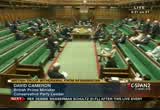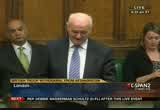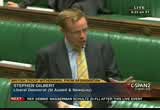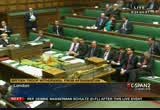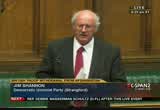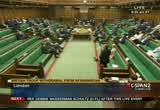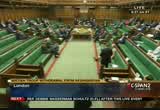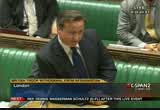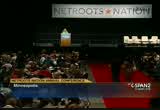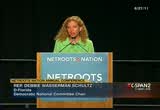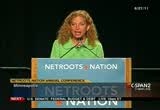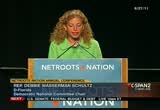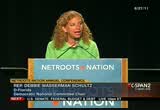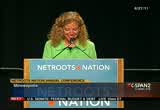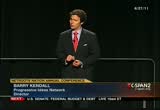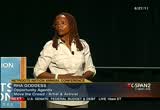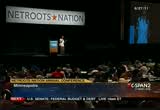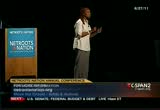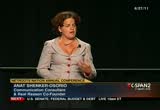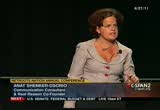tv Today in Washington CSPAN July 6, 2011 7:30am-9:00am EDT
7:30 am
>> thank you, mr. speaker. 12 days ago a young constituent was a victim of a vicious knife attack and another 16-year-old was the victim of a knife attack. will the prime minister condemn this upsurge in gang violence and those that carry knives will be -- will face a custodial sentence if apprehended? >> as i've just said to the honorable lady opposite, it is important that we send a clear message about this. we are doing that with the new offense that carries a mandatory sentence. that is a signal to anyone who is contemplating carrying a five but i think we should be frank with ourselves in this house and in the country that purely looking at this from a criminal justice situation isn't the answer. we got to ask ourselves why so many young children are joining gangs. why aren't families and communities doing more to keep them close and prevent the carrying of knives and that is something that runs right across government and indeed across our society as well.
7:31 am
>> mr. ben bradshaw. >> it is simply not the cases at him prime minister claimed earlier that the prime minister followed the normal process of news corps executives have taken over sky b. >> if you don't follow the correct legal processes you will be judicially reviewed and all the decisions that you'd like to make from a political point of view will be struck down in the courts. you'd look pretty for a day but useless for a week. ..
7:32 am
7:33 am
as i said we are not there to build a perfect democracy. stalin model society. we will help with the establishment of democratic institutions. we can improve infrastructure, develop education and encourage development the we are in afghanistan for one overriding reason, to shore our own national security by helping the afghans take control of theirs. that means building up security forces to drive down british combat forces where the afghans themselves able to prevent al qaeda from returning and posing a threat to us and our allies around the world. this is poignant today on a plot executed by al qaeda and extremists with the same perverted ideology as the september 11th attacks. 375 british service men and women have died fighting in
7:34 am
afghanistan to strengthen that country and keep britain and britain safe from another 9/11 or 7/7. thousands more including many civilians have risked their lives and hundreds have been injured fighting for the security of our nation. they were called to an international coalition involving 48 countries with a specific you and mandate working at the invitation of a democratically elected government. though there have been many difficult times we should be clear about what has been achieved. in 2009 my predecessor, the prime minister told this house that some three quarters of this serious terrorist plots against britain linked afghanistan and pakistan. we must always be on guard. i am advised this figure is significantly reduced. international forces have been bearing down on al qaeda and the taliban in pakistan and afghanistan. osama bin laden has been killed
7:35 am
and al qaeda is significantly weakened. in afghanistan british and international forces have driven al qaeda from its bases and while it is too early to tell for certain initial evidence suggests we halted the momentum of the taliban insurgency in its heartland. mr. speaker, we are entering a new phase in which the afghan forces will do more of the fighting and patrolling and our forces training and mentoring. as president obama said last month the mission is changing from, that to support. when we arrived there was no one to hand over to. no proper army or police. in many places across the country the afghan security forces now stand ready to begin the process of taking over security responsibility. success in afghanistan requires a number of critical steps. the first is making sure the afghan security forces are able to secure their own territory.
7:36 am
there have been well known problems especially with the afghan police but there has been real progress in the last two years. general david petraeus went out of his way to praise afghan forces in a number of complex and dangerous operations. the afghan forces are growing rapidly. now ahead of schedule to meet the current target of 171,600 afghan army and 134,000 afghan police by the end of october this year. they are deploying in formed units and carrying out their operations. there have been some real successes. afghan national security forces prevented insurgents from reaching their targets and eight days ago when a major hotel was attacked the afghan forces dealt with the situation. this was a sophisticated attack. the afghan forces dealt with it professionally only calling in assistance from a nato helicopter deal with the insurgents on the roof. the afghan forces acquitted themselves extremely well and is
7:37 am
growing strength and capability will allow us to hand control of security to afghan forces and draw down -- mr. speaker we remain committed to the objective shared by president hamid karzai that the afghans should assume lead reform stability across the country as a whole by the end of 2015. last month president obama announced that the u.s. would withdraw 10,000 forces from afghanistan by the end of this year and will complete the removal of the u.s. surge by the end of the summer next year. at the time of the u.s. surge the u.k. increased its core force by an extra 500. for our part i have already said we will withdraw 426 uk military personnel by february of 2012 and today i imagine the u.k. will reduce its force levels by a further 500 from 9,500 to 9,000 by the end of 2012. this decision has been agreed by
7:38 am
the national security council on the advice of our military commanders. these reductions reflect the progress being made in building up the a and s f. is worth noting for every u.s. soldier who leaves that the surge is removed to afghans -- two afghans will take their place. this is the start of a process that will ensure by the end of 2014 there will not be anything like a number of british troops as there are now and they will not be serving in a combat role. this is the commitment i have made and that we will stick to. having taken such a huge share of the burden and performed magnificent record decade the country needs to know there's an end point. the level of our current commitment and our combat operations. this decision is not only right for britain but for afghanistan too. it has given the afghans a clear deadline against which to plan and inject a sense of urgency. mr. speaker, there's a clear an end point to our combat role,
7:39 am
after 2014 the u.k. will continue to have a major strategic relationship with afghanistan. a development relationship, diplomatic relationship and trained relationship. above all a vital measure of security interests in preventing afghanistan from once again becoming a safe haven for international terror. although our forces will no longer be present in a combat role we will have a continuing military relationship. we will train the afghan security forces and in afghanistan, in new officer training academy. this was something president hamid karzai asked me for and i am proud that britain is able to deliver. we intend to lead the academy from 2013 in addition to maintaining our current role in the office of candidate school which is due to merge with the academy in 2017. we will continue our efforts to help afghanistan build a viable state but our support cannot be on condition. in my meeting with president hamid karzai i made clear the responsibility of the government
7:40 am
to ensure british taxpayers' money is spent well and spend wisely. i emphasized to president hamid karzai held important it is that he certainly bridge the problems around the bank and the need for a new imf program. i asked him to support the new democratic process. and i made it clear that while britain wants to stand by afghanistan be on the end of our combat mission we, we do so on the basis of afghanistan must help its of too. almost all insurgencies have ended with a combination of military pressure and political settlement. there is no reason afghanistan should prove any different. as we strengthen the afghan government and security forces we will also back president hamid karzai's efforts to work towards an afghan led political entitlement. the death of bin laden presents the taliban with a moment of choice. al qaeda are weakened. their leader is dead. last month the u n adopted two separate sanctions regimes
7:41 am
creating a clear distinction to separate taliban from al qaeda. local peace councils have been established in almost all afghanistan's provinces allow 1800 people from 17 provinces to be enrolled for reintegration. we should take this opportunity to send a clear message to the taliban that now is the time to break al qaeda and participate in a peaceful political process. in this task we need pakistan's assistance. as i discussed last week as much in pakistan's interest as britain or afghanistan. the taliban pose a more wolf read to the states of pakistan as well. mr. speaker there is no reason afghanistan should be destined to remain a broken country. it has fertile agricultural land and stands at the crossroads of asia's training program. it has succeeded in the past when not wracked by conflict. afghanistan has many challenges
7:42 am
ahead. there are security issues and lack of government capacity but ten years ago afghanistan was in the grip of a regime that ban young girls from school, hank people in football stadiums for minor misdemeanors, banished radios and any form of entertainment and incubating the terrorists that struck on 9/11 and elsewhere. afghanistan has come a long way. today afghanistan is no longer a haven for global terror. its economy is growing. it has a developing legal system and basic building blocks of what could be a successful democracy. in helmand province which we should remember with cantar was a stronghold of taliban and the insurgency there's a growing economy -- one of the areas to include in the first phase of transition, is a sign of the transformation we helped to
7:43 am
bring about. as we enter this new phase of transition i'm sure the house will want to join me in paying tribute to our for service men and women who have made such incredible sacrifices to defend our national security. we have been going about our daily lives, they have been fighting in the heat and the dust giving up the things we take for granted. that is the true character of the british army and why we are so proud of all our forces and the families who support them and we are so grateful for everything they do and i commend this statement to the house. >> mr. speaker, i join the prime minister paying tribute to our forces who served with such dedication and heroism in afghanistan. whatever differences separate us on other issues i commend the substance and tone of his statement today and the approach to the issue of afghanistan. mr. speaker, as we prepare to
7:44 am
remember the victims tomorrow, we are all reminded of the reason we are engaged in afghanistan, to secure our security at home. that is why we on this side of the house continued for our forces in afghanistan. we also continue to support the prime minister's contention to end the british combat role in afghanistan by the end of 2014. it is right that we made clear to the afghan government and its security forces that they need to step up and take responsibility for the future of the country. it is right that we make clear to the british people this is not a work with our efforts. this year and next we must maintain a combination of military pressure, accelerated buildup of afghan security forces and work on basic governance and justice. i support the prime minister's plan to maintain british troop levels above 9,000 the last two years, 4 deuce fighting season and the next. this will give our forces best chance of consolidating the
7:45 am
situation before the process of transition to afghan control accelerate in 2012/2013 when our forces come home in greater numbers. i first asked about the issue of our troops commitments can he assure the house that our reduction go-slow, particularly the americans this will not cause british forces to take on a disproportionate share of the burden and can he ensure control of the house the detailed plan for troop drawdown and i am sure he can give assurance. we will always be based on military advice on the ground. we also have troops who do a difficult job testing their circumstances. on the subject of military equipment can the prime minister also assure the house our armed forces will receive all the equipment they need in the months ahead including the 12 chinooks the prime minister promised of which the order has not been placed? mr. speaker, auld professionalism of our armed forces is given the best chance of success.
7:46 am
that will be realized as the prime minister said if we see political progress in afghanistan. just as important as a decision on troop numbers our military strategy is a political track. these are still talks about talks and much worse i am sure the prime minister would agree needs to be done between now and december and indeed after if we are to make the most of the opportunity we have. i have a specific question on that issue. building on the excellent work of the u. n. special representative will the prime minister press for the security council to appoint a senior figure possibly mr. dennis soar above for the muslim world to be empowered to mediate between afghan government and the taliban, those members of the taliban or spies. such a figure could secure the commitment of countries in the region to supporting a new political settlement reflecting their shared interests in long-term stability in
7:47 am
afghanistan. it must remain a red line for the taliban and others must commit to a peaceful political process the current constitution need not be set in stone. will he pressed the afghan eyepiece council to consider constitutional reform including allowing -- the afghan stage is one of the demands for the political -- political differences. these steps being taken now also by the time of the conference in december the ground has been prepared and real progress could be made. as we look to a stronger afghanistan we are also recognizing the governance and rule of law. more about the ongoing scandal over the kabul bank, does it mean this problem symbolizes the inability of the afghan government to distance itself from some of the practices which threaten to undermine the afghan
7:48 am
economy and international development? can he tell us more about what britain is playing to get britain to take the next step to tackle the crisis and allow the imf to resume proper support? finally let me turn to pakistan. we all accept the long-term stability in afghanistan depends on stability in pakistan. when i met president zadari. like amended the pakistan's security forces in tackling violent extreme as in the northwest of the country but as the prime ministers said the situation in pakistan continues to be serious. there's a danger that the death of osama bin laden which should be welcomed on all sides will not have that effect in pakistan. i asked him there for what steps he has taken for british support of counter-terrorism in pakistan at the heart of our relationship to the pakistan government. we all want to see british troops come home at the earliest opportunity, not least all the
7:49 am
families and friends of those who are currently serving in afghanistan. we also want to see the campaign concluded in a way that ensures their service and sacrifice has not been in vain and afghanistan and a wider region moves into a stable future rather than once again posing a serious threat to our security and other countries around the world. so i welcome today's statement and i thank the prime minister. i will work with him on afghanistan and continue to do so we all redouble our efforts on the military front and political front to give afghanistan the stability it needs. >> i am grateful for the right hon. gentleman's response to the statement and across party support over this issue. not only for the mission but indeed for how we are proposing to draw down and bring it to an end and he is right to say the combination of military pressure and build up of the political
7:50 am
process that can enable us to meet our objectives. he asked specific questions on troop commitment. we are withdrawing troops more slowly than the u.s. but of course the u.s. had a surge of 33,000 troops. that number is more like 70,000 so obviously it makes sense for our drawdown to be proportionately smaller but it is important for us to have the drawdown in the way i said. he asked quite rightly we must be careful as this drawdown takes place that we don't put a disproportionate burden on the remaining british troops and i am clear we must not be entering into a large new operational area. we should continue the excellent work we're doing in helmand province handing over to the afghans and seeing the transition -- it may be possible to transition parts of helmand province before the end of the process in a very effective way. on the issue of equipment one thing that struck me on my recent visit i just returned
7:51 am
from and visits over the last couple years is there is now a real sense among our troops that they have the equipment that they need. body armor is much improved. the quality of vehicles much improved. there is no use of land rovers outside bases any more. i think it is very positive what has taken place and some of that action was initiated under the past government and continued under this government funding operational requirements in afghanistan is working well. clearly we need to make sure we have helicopter capacity and the rest of it goes ahead. in terms of -- in terms of talks he mentioned the need for a new international figure. i feel that perhaps the time for that has actually passed. now what we need is an afghan lead process. there are much more effective discussions taking place between afghanistan and pakistan. a more positive attitude on both sides and i think we should do
7:52 am
what we can to keep every possible support. they talked about the high peaks tell. i met with former president r a rabarni who is doing good work in that process. we should be completely hung up on every element of the current afghan constitution but it is important to give a reassurance to the government and parliament and people of afghanistan that there's not a secret agenda to carve their country up. we want to see a strong and stable afghanistan with everyone play apart in its future. in terms of the kabul bank we have surrendered what what -- what went wrong and what happened and need to recapitalize the central bank so the financial system is supported. the uk is massively involved in this process and we are working for a positive outcome. we need it because otherwise funds can't flow into organizations in afghanistan in the way they need to. he is right to command the pakistani security forces for
7:53 am
what they have done in north west frontier and elsewhere. in terms of the british relationship with pakistan, what is important at a time when clearly they are under huge challenge obviously the talk about all kinds of terrorism relationships but to stress all the parts of our relationship and explain that we are there for pakistan for democratic and peaceful pakistan for the long term just as we ought to have a long-term relationship with afghanistan. both these countries fear and the evidence from the past that some in the west will walk away. we must convince we are long-term interests are to be with them. >> mr. nicholas homes. >> that join the prime minister in paying tribute to the magnificent performance of the men and women of all three services and all those who support them in afghanistan. a particularly commend the decision the prime minister has put forward to have a training school in afghanistan and to provide the personnel to provide
7:54 am
instructors and british army are brilliant at that and will do well. they i suggest he might consider whether or not resources might extend to the same thing to provide training for the civil service. >> my right hon. friend is right to -- i misspoke but referring to the british army. i should talk about all the british armed services. it is striking when you are there how many are a f and navy personnel are in afghanistan, not least the marines. i have a great pleasure being able to speak to the uk and also the u.s. marine corps, on independence day, struggle for -- he is right to mention -- it is the right proposal for british involvement in the future. clearly there is also a case for doing more on civil service training and more as well. >> can i ask the prime minister
7:55 am
to reconsider its rejection of the idea of a un mediator? his own arguments about the past record of the afghan government and its present activities show why an independent figure from the muslim world needs to be engaged with the afghan government as a party but also western nations and neighbors. secondly i wonder if he could pick up the idea of a council of reasonable surge did -- stability. he was right to mention pakistan. stability in afghanistan required engagement of all these, not as the pakistani and the dangers people and not just the presence of the taliban and the political system but the northern and other groups and a council of reasonable -- regional stability is essential to give support for a stable afghanistan that we all want to see. >> i listened carefully to what the right hon. gentleman says and he has experience in this and i agree with what he says that the neighbors of
7:56 am
afghanistan are fully involved. one point i would make is what i have seen is there is no shortage of ideas, new processes to wrap around it. the problem is lack of commitment. we need to see real commitment from the afghans to work with the pakistanis and roh commitment from the pakistanis to work with the afghans. hamid karzai has made reasonable points when he visited which is to say there must be the ability to allow a taliban to go to talk but those taliban who don't want to talk must be arrested and confronted by the pakistanis. we can wrap all the processes in the world around it. in the end what we should be about is encouraging real commitment to make the peace process work. >> may i endorse the point being made about the need for regional involvement and stability. the prime minister went to some length to explain what it was the united kingdom would do after the withdrawal of combat
7:57 am
forces. what confidence does he have that other countries, members of nato or the european union will be willing to contribute in a similar way? >> there is good evidence that there's a real commitment in nato. many nato partners say we joined together and should leave together and the growing understanding of what needs to be done in cases like this is to have an enduring relationship rather than just having a short-term relationship. the argument is well understood and if you look at the commitment other nato members have made to the training position in afghanistan it is a positive story. >> as someone who takes a somewhat different view of afghanistan can i make quite clear i pay tribute -- to the bravery of the british troops involved. will the prime minister continue to reject those who argue
7:58 am
against ending the british combat role within the next four years and as far as i am concerned i would like to see it done earlier and is there not a very strong feeling in this country that after ten years the british people want out? >> what the british people want is some certainty about the -- what it involves. my belief is because we have been in afghanistan since 2001 and have been in helmand province since 2006 it is reasonable to say we will be there until the end of 2014 and large number and in a combat role but after that -- that gives people some certainty but also puts some pressure on the afghans to make sure they have worked out how to take their responsibilities as well. the advice i receive from military commanders is this is doable, challenging the on track. >> i welcome what my right hon.
7:59 am
friend said about the modest withdrawal of troops next year and also particularly welcome with my right hon. friend from west sussex what he said about the training academy in afghanistan. is my right hon. friend able to say whether the military relationship going forward after 2015 will also accept beyond that academy to training to mentoring to logistics and other support? >> yes it will. if you look at the numbers, what we are talking about for the training is something like 120, supplemented by other country's personnel and the u.s. has agreed to put $38 million into this training academy. we ought to do more over and above that. national security council discussing how much we should be committing and how much we will be spending but we will be going over and above that for an important relationship to help them build and maintain their capacity.
8:00 am
>> mr. alistair darling. >> may i join the prime minister expressing his condolences to scott mcclaren who was killed in tragic circumstances earlier this week. he came from edinburgh and his loss of life is a reminder of the sacrifice being made by so many young people in this country, in afghanistan. when the prime minister talked about drawing down from levels next year i am right in saying that is reducing troop numbers to the level we have at the beginning of 2009. what i wasn't clear about is after 2014 are we talking about maintaining such a significant presence after that time? i appreciate the different role doing different things but i think the house would want to get some idea we are talking about maintaining such significant presence and also where other countries stand on that. >> the right hon. gentleman asks a totally inappropriate question. what i was saying is we are
8:01 am
going down to 9,000 by the end of 2012. we have to work out the right number for 2013 and into 2014. what i said after that is we won't be in afghanistan in anything like this a number in a combat role. not in a position to give a figure for the enduring commitment through 2015, and beyond in terms of the training role, involves the officer training academy and some other training work as well. we are not in a position to put a figure on that but it will be weighed down from the figures we are talking about today. >> the prime minister has reaffirmed the policy objective in afghanistan is to deny al qaeda a base in which it can attack the u.k. and other british interests. it is fair to assume he is continuing to receive intelligence that al qaeda remains a threat in afghanistan.
8:02 am
this is difficult but would you like to consider whatever way this information can be shared? >> obviously the whole process of sharing intelligence is a difficult issue and some difficult recent historical connotations. what i said in my statement is there was a time when the lion's share coming in terms of threatening people in the u.k. came from the afghanistan/pakistan region. the number has come down significantly since then. clearly al qaeda has been hammered in pakistan with a huge number of senior leaders. could they then have anything like the presence in afghanistan they had when hosted by the taliban in 2001? our aim should be not just to exclude afghanistan from a place where al qaeda can be but to make sure the afghans can go on insuring that without the support of foreign troops if you
8:03 am
like the enduring a that we have. >> mr. bailey. >> i expressed my admiration on the service of men and women of -- when i was in afghanistan -- three weeks ago. as our troops come home we will have a training mission and leave behind a strong and well-trained and well armed afghan national security force. at the current rate of progress, frank mentioned politics. i believe there's a real danger given the history of military dictatorship and authoritarian states in the region that afghanistan could go the same way. what is our government doing to prevent that medium term outcome? >> the hon. gentleman makes a good point which is the more mechanical task of training our afghan army and police is going very well. there were errors in the early days. they have been ironed out.
8:04 am
i was struck by what general david petraeus and general rodriguez said about the quality of the afghan army. as they like to call it, long pole in a tent, strong and sustainable and vigorous quality of afghan government and democracy. there was a standoff between the executive on the one hand and parliament on the other and we have to settle these issues. i don't think we will achieve perfection. this is a country without a longstanding democratic history. we have got to put in place basic democratic institutions and functioning government and the british effort is geared towards that task. >> thank you, mr. speaker. given that for many years our government negotiated with the provisional ira when still fighting there i suspect at some level we will be in negotiation with the taliban. would my right hon. friend the
8:05 am
prime minister agree with me that any negotiations with the taliban, one of the most important things we must put forward is al qaeda should never ever come a part of afghanistan if the taliban were ever to be formed a government or part of a government in that country. >> my hon. friend is right. first of all this must be an afghan lead process. this is about the afghans trying to bring together in their country all the elements that should form part of its future and clearly if the taliban separate themselves from al qaeda and are prepared to give up violence, the basic tenets of the afghan constitution, those are end conditions. if they can do that there's a process, potential for a political process that can speed the end of this conflict. we have to go ahead on the basis of building the afghan army by
8:06 am
continuing with tough operations, taking out taliban insurgents but there is opportunity for political integration process at the low level that can speed the end of the conflict and end up with a more stable -- >> mr. speaker, the prime minister referred to the recent attacks on the hotel in kabul. that is well inside several security rooms. is it not the fact that there are worrying indications that the taliban are implementing parts of afghanistan where they haven't been and how confident can we be that the afghan authorities are in a position to really have complete control of the internal security of afghanistan by the end of 2014? >> the hon. gentleman asks a good point. in terms of the government's security and afghan security forces which is improving all the time. the point i would make is rather
8:07 am
unfair press about the hotel because if you look at how rapidly the afghan security forces were able to clear that hotel of insurgents when there was a regrettable loss of life it was fast and quick and effective, they drove the insurgents onto the roof where they were taken out with the assistance of nato. we have seen attacks like the mumbai hotel and other things were suicide attacks go ahead and all i can say is in the case of afghanistan people who are pretty tough nuts like general david petraeus and general rodriguez were impressed by what the security forces did. we should be talking that up. >> mr. speaker, my right hon. friend -- all kinds of pressures to speed up afghanistan, that would be the wrong reason to withdraw from afghanistan. can i commend him for setting a timetable because that is the way to accelerate the process in kabul and make president hamid
8:08 am
karzai set up and engage in some of the talks that are already taking place and i agree with my right hon. friend is wrong to internationalize this process. it has to be done through tribal structures in afghanistan and fought by themselves and for themselves. is not something we can supervise from the un. >> i thank my hon. friend for his questioning. across the house -- has to the afghan led. we don't want to see a sort of bad tribal -- that would lead to future instability. clearly it has got to be a proper reconciliation process. what i am scene and a timetable has existed, is a positive engagement from afghanistan and pakistan in talking about their shared future and in the end we can push and encourage and work with but in the end those two countries have to make decisions together about how to be more
8:09 am
secure. >> welcome the fact that peace negotiations are seriously under way. and assurances that the rights of women will not be -- because those rights have been hard fought for and we don't want to see them in prison in their homes and children -- when you ask the president to include women in his negotiating team there are many women who are very fearful what will happen in afghanistan in the future and i think they deserve those assurances. >> the honorable lady makes a good point. i would stress that what is run by -- there are a prominent afghan women involved in that reconciliation process. nobody wantss to see a return to the days of taliban afghanistan. i think we have to accept if we want a speedy end to the
8:10 am
insurgency and stability for the long term in afghanistan than what president hamid karzai has referred to as is lost cousins who lost their way have to be brought back into the body of afghanistan and we found this fantastically difficult with irish republican terrorists but we now have sitting in government people who have previously committed to bombing people and the same process has to happen in afghanistan difficult though it is. >> john baron. >> on the importance of the talks of the taliban be in non conditional. just as an unconditional talks with the ira help bring peace in northern ireland. i suggest that the u.s. wish that al qaeda and the taliban to sever all ties should be part of the settlement rather than preconditions. >> where my hon. friend is right
8:11 am
is clearly what matters is the end of the process. if you can get into a political process in afghanistan, people who separated from al qaeda and have given up violence and accepted the tenets of the afghan constitution that is a success but what you can't change is the idea that somehow you let armed terrorists into government. you do have to have some red lines in your mind about what is possible and appropriate. otherwise would you end up with is not stability and not any form of a functioning state. >> caroline lucas. >> the prime minister will know with increasing concern about droned in afghanistan and elsewhere that they will strike civilians. yesterday it was confirmed that drones killed four afghan civilians and injured two others. since military officials are saying almost a third of the raf could be made up in the next 20 years will the prime minister review these? >> i would say to the hon. lady
8:12 am
it matters hugely that we avoid civilian casualties whether we are in operation of afghanistan or indeed in libya. but i don't think the answer is to turn our face away from the modern technology that is now possible to pinpoint people who are doing us harm. as to technology being used in afghanistan through drones and other aerial cameras hugely effective in actually driving back taliban insurgency and taking people who are doing us harm. >> prime minister, recently -- post deployment to afghanistan. much good has been achieved. i would use caution on the speed of british troops withdrawn in case all that good work comes to nothing. in particular if i draw his attention to what happened in the summer of 2008 when the four battalion of parachute regiment joined forces to take a turbine
8:13 am
down. three years later it has not been connected up. >> my friend make that good point. i don't want to ask to jeopardize the success that has been had and i would say from the many conversations i had with service personnel many of whom are going back to afghanistan for a third or fourth time that iran is extremely high, the sense we are achieving good things in afghanistan is there. we have to focus on what is effective and in many ways one of the problems we had is actually the effective method of counterinsurgency we are now pursuing, protecting the larger population centers and making sure the main transport routes are open. we should have been applying that earlier and some of the things we took part in in years gone by may have had some important symbolism to afghans. the real symbolism is protecting large population centers so
8:14 am
people go back to their daily lives. >> paul flynn, prime minister support the campaign by his own constituents and many families of the bereaved who are asking the position between the bodies in the country are rerouted through urban areas so that local people can publicly express their respect and the families can express their grief and the country can be reminded of the true cost of work. >> i am glad the hon. gentleman raised this issue. the constituency of close interest in this, i tried to allow the greatest possible consultation, the armed forces and the ministry of defense and local councilors and across the district council and i believe what has been arrived at is actually a sensible route that is going to have a far better
8:15 am
center for families with in the air base and then there is real money being spent on a memorial guard who will be able to show the respect to their loved ones. a lot of thought has gone into this. we must keep it under review and make sure it is done in the right way but there's a great danger sometimes whether it is the local mp or the prime minister of stepping in without actually allowing people to they term and what is a good outcome. let's see how it works in practice before we jump to conclusions. >> dr. julien live it. >> if we tour achieve -- to achieve a political settlement in afghanistan there must be an incentive on the taliban to negotiate a deal. at the moment there is none. has he received any indication from our american allies that they are contemplating the preservation of a long-term
8:16 am
strategic base in the area which would show the taliban and any future government in which they participate that the return of al qaeda or other international terrorist organizations would not be tolerated and could easily be punished? >> my old friend makes a good point. there is an incentive on the taliban to a join a political process because taliban mid level and high level leaders are being killed in ever larger numbers and what you see now is in some sense lowering morales of the taliban within afghanistan because they're brave mid-level and high level leaders are cowering over the border in pakistan. that is what has happened and we keep that pressure. of course we need to work with the afghan citizens of long-term capability that the afghans can go on dealing with an insurgency if it is still continuing even
8:17 am
in a minor way into the future along the lines he suggested. the taliban are under huge pressure because of the surge and the effectiveness of operations in which we are engaged. >> frank white. >> in afghanistan, we will not drawdown on the people who get diplomatic -- in the country. >> it is hugely important we secure those who work in our embassy. are had the fortune of meeting many people in the kabul embassy, one of the biggest embassies in the world. they have to make huge compromises to work out in such a difficult location and security talking of our agenda. >> laurie stewart. >> it takes with them to set the date of withdrawal but enormous courage to stick to that date. the prime minister reassure us that no amount of lost lives or
8:18 am
over optimistic promises from generals or fear of lack of progress will ever shake his resolve that britain will be entirely out of combat operations by the end of 2014 at the very latest? >> i can give my friend that assurance because it is important to give people a sense of an end time to these combat operations and as he said it is always difficult to change the laydown of british armed forces but i would argue one of the early decisions i made focuses to go out on -- was a hugely important making sure we had the right concentration of forces on the ground to do the job we need to do. i should think it was a very important measure to make us more effective. that doesn't mean lives have been lost in vain. the americans are doing excellent work. you do have to make difficult decisions for the long-term good of your arm forces but also your
8:19 am
country. >> in his discussions with president hamid karzai this prime minister raised the issue of the exodus of thousands of afghans from afghanistan. i raised this in the house previously. 50,000 afghans crossed the border between turkey and greece last year. the threat of al qaeda receiving in afghanistan, it is increasing in yemen. what are we going to do about country shocking by al qaeda? >> i think the hon. gentleman is right. one of the purposes of having a national security council is to sit down and look at the scale of the threat we face and where that threat is coming from and the threat picture is changing in the number of threats coming out of pakistan, afghanistan area is reseeding and a number from yemen and somalia is growing. we have to work out how smart we can be in combating that threat.
8:20 am
that means learning lessons from iraq and afghanistan about how we combat extremism and violence in those countries and i am determined that we learned those lessons. >> can i say i welcome this -- in particular i welcome the prime minister's reminder to hamid karzai that his government is responsible for assuring british taxpayers' money is spent wisely and well. can the prime minister assure british taxpayers measures are in place to assure that doesn't happen? >> i can give that assurance but not everything has been satisfactory up to now. the situation at the kabul bank has been an appalling situation. we now have it moving towards a solution because there will be a forensic audit and recapitalization of the bank but we need to put in place procedures within the afghan government so there isn't the level of corruption and waste of money that there has been. >> i fully accept the prime
8:21 am
minister's argument that by 2014 -- he can't emphasize how many troops are there. i am surprised he can be so certain it will be non-combat drones. if this anticipates the next year is not as positive as he thinks it will be surely it would not have our troops out in a situation where security cannot be secured and may require a combat role. >> let me turn to the hon. lady's question the other way around. if we are still in afghanistan in 2014, in the numbers we are now and in the combat role there will be something fundamentally wrong with the strategy we are pursuing. the point is we have a program, we have a plan. involved the buildup of the afghan national security forces which is going well ended does involve working with our allies which is going well. it involves close cooperation
8:22 am
with the san the afghans all of which can be done. that is what we should focus on. >> can i welcome the statement by the prime minister that a key element in achieving long-term stability in afghanistan and pakistan is providing good quality basic education which we will give them hope and opportunity and either way from sectarian -- >> my hon. friend is entirely right. if you look at the huge population growth in pakistan and the fact that you have more than ten million children out of school, what sort of future will they grow into? with extremism will they be prey to? despite the frustrations sometimes that afghanistan can't do more itself in terms of education i think we are -- very targeted program in order to put more pakistani children through school. >> rev. william mcrae. >> i welcome the prime
8:23 am
minister's statement to the bravery and dedication of our soldiers and security personnel in afghanistan. will the prime minister assure that when we withdraw from afghanistan it will be at a time we have achieved our overriding goal to ensure our own national security? >> our goal is afghanistan can secure itself from al qaeda and terrorist bases without the need for british or other forces. that is the goal and what building up security apparatus is so central. all the other things we talk about today, those are important to security. that is the absolute key. >> steven gilbert. >> i welcome the prime minister's afghan led political solution but -- in honor of the british service personnel who died in afghanistan that solution must be cleared the rights of women and must include
8:24 am
rights of other minority, religious freedom and commitment to developing democracy. can you assure me that in talks about detailed talks, some of his red lines came about? >> those things are guaranteed through the afghan constitution and afghanistan is a huge step forward. knowing president hamid karzai and i do i know he wouldn't agree to an afghanistan that was miles away from the sort of human rights development he wants to see progress but we have to have a hierarchy and the hierarchy of needs from the u.k.'s point of view is to focus on security and the capacity the afghan government has to secure its own country. other things have to take place behind them. >> mr. john woodcock? >> guaranteeing that this will be ordered, is that right? >> we have made announcements about chinooks being ordered and we will stick to those announcements.
8:25 am
>> mary mccloud. >> peace and stability in afghanistan helped by leaving an entire lasting legacy and i welcome the officer -- in school. also agree with me that it is important for education for all especially young girls. >> i do agree. if you want to see a long-term stable afghanistan that cannot be possible by excluding half of the population from being educated. if you look right across north africa and the middle east, permanent education of women is not just important for human-rights but also economic development and peace and progress as well. >> i welcome the prime minister's statements. back in march of this year, honorable members -- the opportunity to preserve afghanistan to our province. and some of the people from --
8:26 am
oppressed by their energy and commitment. what they did need was a $6 million -- and could the prime minister give us an indication that there's going to be a transition of power or security? there needs to be training of police and the start of that in the province. >> i make two points. the police training colleges up and running and working. i visited it myself and it is taking huge steps forward. one of the tragedies of this is police training was the responsibility of other countries and britain had to take on some of that and do it directly and do it very well. the town itself is going to be one of the first places in afghanistan to transition. is imminent already today that security is provided by afghans for afghans.
8:27 am
having been there many times, i find that fact pretty staggering and encouraging and you should too. >> given that the raw material, high proportion of illegal drugs on britain streets starts in afghanistan what progress is being made in getting farmers to grow other things other than poppy and is the prime minister confident the afghan government will continue this work once we left? >> we are seeing progress on this. britain is invested in the wheat seed distribution project. one of the lessons of going to the country repeatedly in the last five years is if you want to do something about poppy cultivation you can talk all you like about destroying crops. the real key is building roads because you have got to enable the afghans to get their produce to market. if they don't have legitimate produce to get to legitimate market the drug dealers will prey on them and give them their poppyseed at the end of harvest and the job is done. it is about roads and government
8:28 am
capacity as much as the criminal justice system. >> given the prime minister's remarks about the need to build the afghan school structure he will have seen some media reports today. i wonder if he would confirm whether the u.k. is considering sending senior civil servants or officers to kabul on a permanent basis? >> i had the honor of meeting with the speaker of the afghan parliament. as i understand there are going to be good and strong relations between this parliament and the afghan parliament which is beginning to establish itself. i leave decisions for the mr. speaker wants to do to mr. speaker. >> i welcome the prime minister's comments about afghanistan but i wonder if he could update the house on what progress is made in schooling and how far we progressed in education and where that leads
8:29 am
us now. >> the hon. gentleman asks a good question. i will write to him with the specific figures for the number of afghans in school in helmand province and elsewhere. we see very good progress but i will write you with the exact details. >> we come to the ten minerals motion. mr mark menzies. >> i beg that we've been given to bring in a bill that the secretary of state prevent local authority -- >> heritage foundation reviews the recently concluded supreme court turned. legal scholars and journalists break down the high court's major decision of the last year. live coverage begins at 10:00 a.m. eastern on c-span. >> c-span has launched an easy to navigate web site for politics in the 2012 presidential race. the latest events from the campaign trail. bio information on candidates. original twitter feeds from political reporters and links to
8:30 am
c-span media partners in the early primary caucus states. visit us at c-span.org/campaign2012. >> at the annual nation convention in minneapolis congresswoman debbie wasserman schultz called on attendees to use all methods to give president obama reelected and win the democratic majority in the house. congresswoman debbie wasserman schultz was named chairwoman of the democratic national committee. this is an hour and a half? >> ladies and gentlemen, please join me in welcoming the chairwoman of the democratic national party, congress woman debbie wasserman schultz. [applause] >> good afternoon.
8:31 am
it is absolutely fabulous to be with you. this is my first year. i was so excited to be asked to come a couple months ago. some of you may know i was privileged to get a call from president obama to asked me to serve as chair of the democratic national committee. when the president calls and asks you to do something the answer is pretty much always yes. but more importantly for me as a give me the ball kind of person i was absolutely thrilled that the coach put me in. in 2008 president obama ran a campaign powered by people at the grassroots level. you know that because you were an essential part of his grassroots team. as the name of this conference implies, it brought our nation together for president obama. grassroots and now a netroutes campaigning has been important to me as well. you are looking at someone who won her first campaign in the
8:32 am
face of opposition from the good old boy network that was and is alive and well by knocking on 25,000 boards in the middle of florida's summer heat. thank you. when i think back on that race i imagine how many more people i could have reached back then and it was in 1992 so 18 years ago. if i had access to the kinds of social media tools that are now available, i scraped together $21,000 and the only way i had to reach the vast majority of voters that i needed to go to the polls to convince them to vote for me was my shoe leather. that was great shoe leather work for me. it was 53% of the vote. but thank you. thank you. now democratic candidates have the opportunity through the netroutes to reach so many more. thousands more people.
8:33 am
there are progressive officeholders across the u.s. including in the white house that would not be in office. if not for the tools you develop that you expanded and brought to the masses they are there, those officeholders are there because of view. thank you so much. as a progressive i certainly thank you so much. thank you. i will applaud for you. progressives have been better able than conservatives to take advantage to win progress. that is entirely to your credit.
8:35 am
8:36 am
to provide volunteers information right at their finger types. we're using new technology for online organizing meetings that are almost like house meetings and i can't really see this in action. attendees can see each other by video conference, participate in polls to make decisions as a group and even move into small group breakout sessions and report back on their conclusions. it just sounds so incredible cool. the effects of this new technology is to provide online supporters with a volunteer experience that feels like the volunteer experience that they'd have in an offline office and a powerful tool to have as we move to the new election. now, as we continue to look for new and ino-vatetive ways to look out to voters and activists fiscal be incredibly important we use new and ever more tools to do that. we're making sure that we leave no stone unturned. already we're holding volunteer trainings across america and reaching out to voters from across the political spectrum. we want the presidential's
8:37 am
re-election campaign to be inclusive of all americans and to embrace the voice of the grassroots and netroots to be the voice of the people. because we know that your support is absolutely essential to the president's success. now, just recently we had a chance to see our party infrastructure at work and the results were extremely positive. in a special election in new york's conservative 26th district we were able to newly elect cathy hokele. thank you very much for sending me a newroom. cathy and i are living in the same townhouse as well as with others but this was -- you know, to give you a little personal information, i know. tmi, i know. [laughter] >> but this race was instructive for two reasons. first, that election showed once again that our grassroots activists are prepared and willing to put in the kind of time and effort that makes a difference in close elections. bloggers and online activists
8:38 am
played a huge role in making the upset possible by keeping that race in the national eye by raising the money that cathy hokele needed and keeping her republican opponent on the defensive. so thank you for that as well. in addition in the days leading up to the vote our volunteers made tens of thousands of phone calls and thousands of in-person voter contacts and we expect that same level of effort and enthusiasm in 2012 and we're going to need you to help generate it. second, we learned we aren't buying what republicans are saying. cathy's republican opponent and the people who spent a small fortune against her in a solidly republican district found out the hard way that their extreme plans to end medicare and slash medicaid and investments in health care, education, innovation and job creation are just plain unpopular. funny, not really surprising, is it? republicans, though, still continue to tout the same failed policies. they are saying cutting taxes
8:39 am
for the wealthy and allowing businesses to self-regulate again is a silver bullet for the economy. that we should just trust them because that worked so well for us in the last few years, didn't it? but we know better than that. we saw what happened under president bush. republican policies was bad for america now and they are bad for america now. republicans want to repeal financial reform setting americans up for another financial crisis in the future. and republicans want to do away with the consumer financial protection bureau taking us back to the days when americans could be buried by the fine print on their mortgage or their credit card agreement. but republicans aren't just bad for the economy. they're trying to take away our most fundamental rights and that is unacceptable and we are not going to stand for it. [applause] >> unacceptable. thank you. we've seen republican governors strip away the rights of public employees to collectively bash in wisconsin and ohio. we've seen republicans in congress to take steps to
8:40 am
curtail women's reproductive rights. we've seen republican governors in states like florida and wisconsin enacting voting laws that restrict voters rights to cast their ballots. in more than 35 states across america, republicans have pushed for photo id laws that cost states millions and hurt minorities, the elderly and young voters. unacceptable. and we will not stand for it. the democratic party will fight these laws and we are continuing to work to expand the electorate but we're going to need your help, folks. there are big issues facing our country right now. i don't have to tell you. we need long-term solutions for our debt and our deficits. we need to invest in education and infrastructure and we need to get our country on track with sustainable energy solutions. just to name is few. we've got a lot of work to do and i know all of you have good ideas. democrats are the party of big ideas and new technology and we want your input. please feel free to give it to us. i know i'm going to have to really push you hard to offer your opinion on the issues that
8:41 am
matter to you so, you know, just try to give us a little help. republicans want to take us backwards on the other hand. they think cutting taxes and deregulating everything solves all of our problems. it doesn't matter what the issue is, their solution is cut taxes and deregulate. now, that might make for a good sound bite but it's not good for real people. so we're going to hold them accountable with their wrong-headed ideas. we're going to hold them accountable from today until election day. we're going to reelect president obama and retake the house and hold onto the senate. i cannot thank you for your devotion and your dedication. you are critical to our efforts so i will see you on the trail and online and onto to victory in 2012. thank you so much for having me. [applause] >> all right. let's give another hand for
8:42 am
debbie wasserman schultz. thank you. godspeed. [applause] >> let's have a big hand for the california school employees association for providing us with lunch today. [applause] >> and one last shoutout i would like to say a thank you, thank you to jen and kona. her plenary session last year on a progressive economic vision was the inspiration. and the starting point for our session today so thank you to jen. [applause] >> yeah, let's give jen a hand. i'm barry kendall. i'm the executive director of the progressive ideas network, a membership organization and collaboration platform for federally focused think tanks, policy institutes and other organizations that travel in the world of ideas. our partners work in a wide range of policy areas everything from national security to immigration reform to transportation infrastructure,
8:43 am
but there is a through-line in all of the work that they do and i think it's the same through-line in all of the work that we do as progressives as well and that is a concern for the ideal of equality. when thomas jefferson declared that all men are created equal, he was making the argument for the people of this country to be independent from the king of england and from an old world system of assigning privilege based on birth. and based on one's station in life. we said no to that. we said goodbye to all that and we still say goodbye to it today. but he was also setting forth for this country a long-term project and it's twhaun we're still working on today. we and the generations behind us have made great strides toward that goal but if we look around at where we are right now, we
8:44 am
have to admit we are no closer to that goal of political economic and social equality today than we were 100 years ago. that are disrupting and distorting the function of our democracy and that are putting up barriers between ordinary hard-working americans and their pursuit of happiness and again, today we as progressives -- we as americans -- we have to say no to all that. again. and we have to fight to make it reality. and our panel today is going to tell us about how we can break down the barriers on the road to prosperity and how we can talk about it, too. so before we get started, i just want to let you all know that we're going to be taking questions from you, for our
8:45 am
q & a session at the end on twitter. we'll be using the hash tag nobarriers, all one word, hash dag -- tag nobarriers with the hash tag. you can also follow me at barracuda sf but i won't be tweeting during this session but i will be looking for your questions at hash tag nobarriers. so let's get started. in the fight for equality we know we must engage the hearts and minds of as many people as possible. and that we have to make room for and lift up the narratives from the unheard voices in our society, from the very people who are suffering the most in our current economic conditions. last year, an organization called opportunity agenda commissioned our first presenter to develop a performance piece
8:46 am
that would tell the stories of the experiences of these americans through the lenses of issues like jobs, health care, and transportation. she's going to share an excerpt from her work and talk about her journey in developing it. please join me in welcoming to the stage -- >> my name is consuela ruiz, every morning i wake up at 4:45.
8:47 am
i care for my three grandchildren, nadia, hector and ramone. they need to be to school by 7:45 so they wake when i wake. after i bathe, i make breakfast at 5:25. out the door, sit down to eat at 5:50, out the door by 6:10. then we walk 20 minutes to the bus stop. i used to take the 73 before they changed the route last year. the 73 used to go directly to my job. it would drop me off a block and a half away and take me maybe 45 minutes. that bus used to be my lifeline. not only could i take it to work but i could take it to the hospital for my physical therapy appointments, to go food shopping on the weekends and even for my classes at night. but not anymore. now, i catch the 52 in the morning. it's supposed to come at 6:40. if it's on time, i make it to
8:48 am
holden market by 7:30. then catch the 83 at 7:55 which i make it to 7th and prince by 8:30, that gives me just enough time to walk the 10 blocks and be to the luna deluxe by 9:00. but if any of these buses are late, i'm in trouble. because if i miss the 83 at 7:55, the next bus doesn't come until 8:15 and it's always packed. that puts me on the 8:45 and that puts me in trouble with my boss. one morning i was riding the bus and a lady she tells me they're going to cut more lines including the 73 on weekends. i'm listening to her but i just don't understand how they could do this. how are people supposed to live? there's nothing in our neighborhoods, no grocery stores, no fish market, no nothing, so i'm thinking what am i supposed to do now? the lady she said she was going to join the bus riders union to make them stop the cuts.
8:49 am
she pointed to a young man on the bus handing out applications. so i went up to him and i asked for one. when the bus riders union application asked me how many hours a day i spend riding the bus, including my waiting time, i realized it's five hours a day just getting to and from work. now, i don't want to join the union, i want to make a change. i start attending the monthly meetings to help create the demand. then i learn about the different protests and decide to become more involved. these transportation commissioners make all of the decisions about our lives and nobody from our community is even invited to the table. every year they raise our fare while they continue to cut our service. nadia, my granddaughter and i had a fight the other night about the dishes. why should you care, she says, you're never around. you're always working on that bus thing. this hurt me because i work very
8:50 am
hard to take care of her and the boys. i grab her by the shoulders and i ask, why do you think i do this? i want you to be proud of who you are and where you come from. i want you to know that sometimes you have to stand up even when it isn't easy or convenient. but mostly i want to show you, nadia, that even somebody like me can learn how to fight. [applause] >> it is such an honor and a privilege to be here with you today. so in the summer and fall of 2010, i had the privilege to move through different parts of this nation and sit at the kitchen table with every day hard-working people who are trying their best to navigate what is undisputedly been one of
8:51 am
the worst economic times in our nation's history. i had the opportunity to do this as a result of a commission i received from the opportunity agenda. i like many of you stood back in shock and on horror on that fateful day of september of 2008 as we watched it all come crashing down. and as much as there was so much dialog and back and forth happening, i like many of you knew that we were only getting tiny pieces of the puzzle. i had so many questions, like what had really happened. like how bad had it really gotten for every day people. was the stimulus package even making a dent? and more importantly, was that money and those resources getting to the places that needed it most? could a speedy recovery be expected or was a recovery at all even certain? moreover, to what degree were organizations like the opportunity agenda and others
8:52 am
able to make a difference. and how might the work we do today provide a more equitable recovery and ultimately a more just economy in the future? i pondered these questions as i traveled the country, coming face-to-face with all kinds of people, tracing the patterns and connecting the dots between advocacy and policy work, front line community organizing right on into the center of lives of ordinary people and i can tell you that what i saw, both inspired and appalled me. there were places where i was so proud of us but also places where i was deeply ashamed. the shame came from the many people i saw who were suffering in isolation and silence. as if their own personal hardship were not bad enough, the fact that they did not have a voice and moreover did not see or feel themselves entitled to a voice made matters even worse.
8:53 am
somehow they viewed the hardship that had fallen upon them as individual, as a personal challenge that they would have to navigate and figure out on their own. the moments much inspiration came from meeting people like consuela who somehow got ignited and used this moment to engage the structures that be in a way that they never would have imagined before. and i think that's one of the bright spots that we can say this happened as a result of this fallout. that more and more people are being ignited through their passion and through their commitment. people who would never identify themselves as activists or advocates or organizers or politicians or check any of the other boxes perhaps that you and i might check on in any given day and i think the excitement as messy as it is, the excitement about their action and their activation is the potential for true democracy to really start to be -- to come to
8:54 am
the fore. the interesting thing for me in particular about what distinguished the people who were quiet from those who had chosen to be ignited and take it to the streets was very simple. it was education. their ability to fully understand how what was happening to them was not an isolated incident. but, rather, the product of a systemic meltdown after years of dysfunction and dare i say abuse and neglect. so their education didn't come from the rhetoric, though. it didn't come from the political banter and the back and forth. their education simply came from identifying their own struggle and humanity in the struggle and humanity in another, which is why lifting our stories from the
8:55 am
ground is so important. the challenge i believe we face now is that when it's all said and done, if we're not careful, will we have a new shade of business as usual or will we seize this moment to not only shape a new economy but to transform the culture of capitalism from the obsessive single bottom line focus to a culture that is more accessible, more equitable, and more sustainable for us all. i thank you all for the privilege to be here today. [applause] >> so stories help us connect to the emotional stakes of an issue. framing helps us connect to how people actually think at a subconscious level most of the time about an issue and what
8:56 am
they think ought to be done about it, our next speaker is going to help us unlock that mystery. she is a communications consultant based in oakland, california. and -- [applause] oakland! and she applies the tools to understanding political discourse and i got to tell you she's been embarked on a two-year project on analyzing and making recommendations around the framing of how to talk about the economy. if you missed her session yesterday morning, numbers and cents, please check it out on the video archive. it will be worth your while. in 2009, the progressive ideas network commissioned her to do research into framing on the question of inequality, and she's going to give us is peek into that research today. not just how people really talk about the issue but what their words tell us about what they think inequality actually is, how it came to be, and what should be done about it. ladies and gentlemen, this is
8:57 am
the progressive framing expert that you all need to know about. please welcome to the stage our next speaker. [applause] >> thank you. thank you so much for having me. i'm here because i take it as a given that all of us know that inequality is not a problem. it's the problem. and so i'm here to share with you today my research into people -- into how people make sense of this issue. my research is rooted in a central insight from cognition, and that is whenever we think about a complex intangible concept like inequality or the economy, we do so automatically and unconsciously by likening it to things we know well. we call these in my field mental models or simplifying models and they are not created equal.
8:58 am
some of them help us see inequality as something fundamentally important that we need to address. and others have us believe it's the product of individual failings, a force of nature. can't do anything about it. and so how do we talk about inequality most often? what do we imply it is? to hear us tell it, inequality is a divide in horizontal space. it's a chasm. it's a canyon. it's widening. it's a gap. and while this language is admirable for taking tangible and physical, something that has no actual shape or weight, it has us focusing entirely on outcomes. it tells us pay attention over here. entity a is different than entity b but it remains silent about why those outcomes came to be. what we know from cognition is
8:59 am
that when we don't tell the story of what caused in this case inequality, people fill that story in for themselves. and we know the story they're telling. there's a gap, of course, because some people work very hard and deserve their riches. and some people are simply lazy. gaps show that we live in separate, therefore, separateable economies when, in fact, we know the reason that some people are as rich as they are is because others are as poor. and so what other ways do we have to talk about inequality? and, in fact, we see this at work. we see it in cities next what you're seeing an international survey that was taken asking people where they think wealth or poverty co
115 Views
IN COLLECTIONS
CSPAN2 Television Archive
Television Archive  Television Archive News Search Service
Television Archive News Search Service 
Uploaded by TV Archive on

 Live Music Archive
Live Music Archive Librivox Free Audio
Librivox Free Audio Metropolitan Museum
Metropolitan Museum Cleveland Museum of Art
Cleveland Museum of Art Internet Arcade
Internet Arcade Console Living Room
Console Living Room Books to Borrow
Books to Borrow Open Library
Open Library TV News
TV News Understanding 9/11
Understanding 9/11